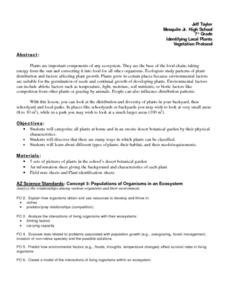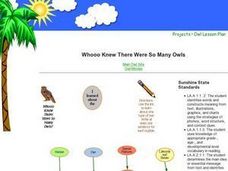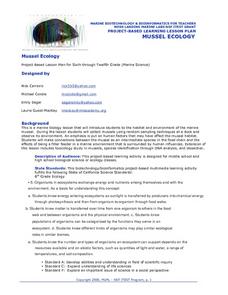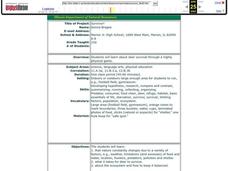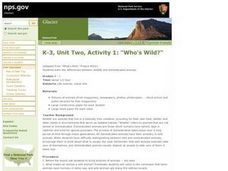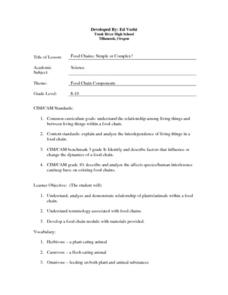Curated OER
Wetland Metaphors
Learners describe the characteristics of wetlands and identify their ecological functions. They inspect items and use them to create metaphors about wetlands.
Curated OER
Where is Sophie?
Learners use GPS to scrutinize the movements of a grizzly bear named Sophie. They answer a series of questions like; where she forages, her zone of influence, and human interaction. They read the story of Sophie, the collared bear in...
Curated OER
School Forest
Sixth graders explore the concept of biodiversity. In this biodiversity lesson, 6th graders discover a variety of planets and animals that live in forests, and how a rotting log benefits that environment. Students also locate seven...
ARKive
Marvellous Mini-beasts – Design a Species
Here is a creative activity that teaches kids how species evolve different characteristics for survival. The lesson begins as the class discusses and examines the adaptive traits of mini-beasts or insects. Then, in small groups, they...
ARKive
Temperate Rainforest in the Pacific Northwest
Explore the amazing temperate rainforest of the Pacific Northwest. Your class starts by investigating the animals and plants of the Northwest, specifically Washington, and then research an animal population common to the area. In small...
Curated OER
U.S. History: Antebellum Heroes and Villains
Eighth graders research and write reports on key figures of the Antebellum Period. The projects also include pictures, bibliographies, and timelines about their assigned figure. In addition, 8th graders present oral reports to classmates.
Curated OER
Whoo Knew There Were Owls
Students research information on owls using the Internet and Kidspiration. They work in groups to create a poster which includes habitat, diet and life cycle and present to the class.
Curated OER
Trout Cookies
Students explore the external anatomy of a fish. In this anatomy and adaptations lesson, students look at an image of a trout and identify its various external features including fins, eyes, spots, parr marks and lateral line. Students...
Curated OER
Lesson Five
Students study ocean habitats and create a habitat zone replica. In this ocean habitat instructional activity students design and construct their own unique habitat.
Curated OER
Watch Over Wild Wanders
Students collect and organize data relating to migratory species and habitats; undertake a habitat action plan, then maintain planting and building projects for continuing benefit to wildlife; understand the unique needs of migratory...
Curated OER
Going Buggy!
Students study bugs over a four week period. In this insect collection of activities, students observe insects covering basic science concepts and skills, such as classification, observation, and responses to habitat. Students develop...
Curated OER
Dr. Green's Rainforest Mystery
Third graders create a brochure describing all of the information researched about a specific animal. Using this information, create a 3-D model of the animal and its habitat that could later be used to design an appropriate living...
Curated OER
Painting - Science Integration - Ponds - Monet - Painting
First graders identify Monet as an Impressionist artist. They create impressions of trees and bushes, paint with sponges, and mix tints and shades. They create impressions of flowers with q-tip dabbing and mixing tints and shades.
Curated OER
Mussel Ecology
Students are introduced to the marine environment of the mussel. The emphasis of the lesson is upon what human factors are present to influence the environment in positive and negative ways. They brainstorm in groups in order to conduct...
Curated OER
Digital Animal Presentations
First graders explore animals and digital presentations. They chose an animal and identify the physical traits of the animal. Students classify the animal using the physical traits. They create a presentation about their chosen animal.
Curated OER
Inviting Butterflies to the Schoolyard
Students create a butterfly garden. In this butterfly garden lesson, students plot a garden with plant species that will attract butterflies. Students learn about the specific plants and items that will help butterflies use the garden.
Curated OER
Puffin Patrol
Bird diversity and the majestic puffin are the topics of today's lesson. Children discuss and look at images of puffins, and then they use felt to put a puffin body together. After that they talk about what and how puffins eat. They get...
Curated OER
Week 8 - Sea Life
Using a magnifier, mini marine biologists examine the barbules of a bird feather. They swirl the it into a mixture of oil and water and then re-examine the feather. After the activity, discuss how the oily feathers pose a problem to sea...
Curated OER
Aquatic Exotics
Students identify and describe the aquatic exotic species found in Illinois. Using the internet, they research the species origins and discover their effects on native species in the area. They discuss how appropriate it is to introduce...
Curated OER
Biodiversity in Sixth Grade
Sixth graders explore the nature of habitats on an ABC hike. In groups, they collect items that make up habitats including plants, feathers, and leaves among other materials. Students then classify and organize the collected materials...
Curated OER
Survivor!
Students play a game in physical education class to examine how a deer survives. Using nature as a guide, they discover how it is constantly changing due to weather, food, water, pollution and predators. They discuss the characteristics...
Curated OER
Who's Wild?
Students explore the differences between animals of the wild and domesticated animals. In this wild animals lesson, students understand that tame animals ancestors were once wild. Students illustrate the differences by drawing a wild...
Curated OER
Food Chains: Simple or Complex?
Students explore the relationships within the food chain between plants and animals. They construct modules of food chains, keeping them simple and not complex. They focus on what the animals eat and not on what eats it.
Curated OER
Publishing a Newspaper about Biomes
Young journalists create newspapers of individual biomes after researching their biomes. This instructional activity can be completed in three phases and concludes with each person publishing their individual newspaper pages.







